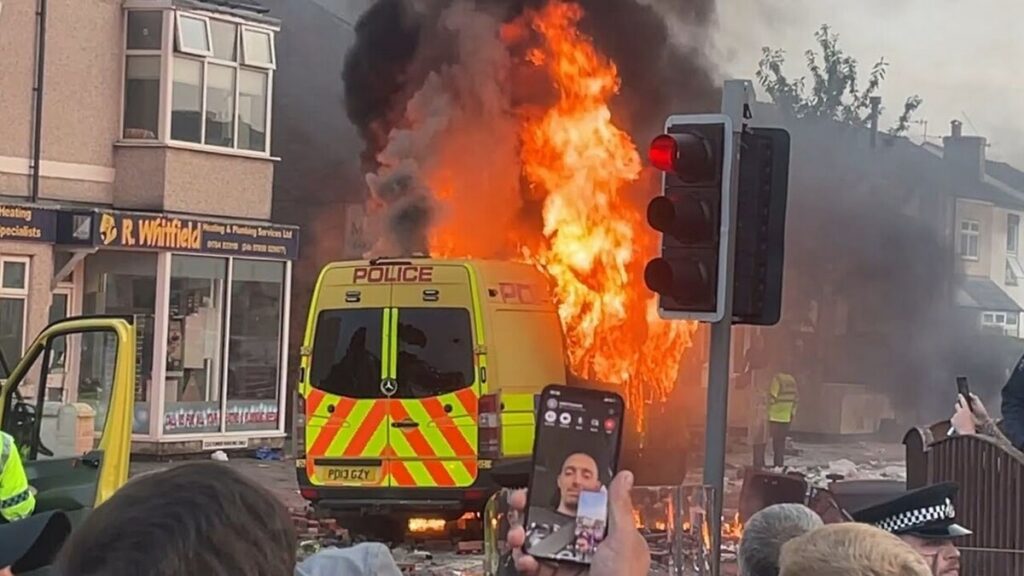Historical Essays, International Politics
The roots of the riots: What’s happening in England?
At 11:45 AM on the 29th of July, 17-year-old Axel Rudakubana got out of a taxi at Hart Street in Southport, England, walked into a Taylor Swift-themed dance workshop at a community studio, and started stabbing. There were 25 girls present, and by the time the carnage was over he had managed to stab eleven children and two adults. Six-year-old Bebe King and seven-year-old Elsie Dot Stancombe died at the scene. Nine-year-old Alice da Silva Aguiar died in the hospital the next day. Rumors immediately spread online that the killer had been a Muslim, fuelled by memories of the Manchester Arena bombing in 2017, when Islamists attacked an Ariana Grande concert, killing 22 people and injuring more than a thousand others.
On the evening of July 30, a vigil was held outside the Atkinson in Southport’s Eastbank Square, with thousands of people arriving to leave flowers and notes at the scene of the attack. Many suspected that the authorities and the press were deliberately hiding the identity of the killer, and that evening, a group attacked a local mosque, throwing bricks and bottles and brawling with police. Some officers were injured, and a police car was torched. Other riots promptly erupted across the north of England and elsewhere, including Aldershot, Hartlepool, Sunderland, London, and Manchester. The mainstream press presented the reaction as far-right mob violence; online, videos of armed Muslim gangs taking to the streets were also circulated.
The British state made over a thousand arrests and began handing down hefty jail sentences even for social media posts. Prime Minister Keir Starmer insisted that the unrest was merely the purview of a handful of troublemakers; his critics responded by calling him “Two-Tier Keir,” accusing authorities of being far harsher with critics of the regime than with immigrant troublemakers. At Unherd, Simon Cottee noted that there were three primary types of rioters: combatants, some of whom were genuinely racist and others who saw themselves as protectors of British women and girls; “Geezers and scallies,” who jump at the chance to riot for any reason; and “losers,” who joined in spontaneously due to booze or other situational circumstances.
There has been no shortage of commentary attempting to explain all this over the past several weeks. Douglas Murray’s prophetic 2017 book, The Strange Death of Europe: Identity, Immigration, Islam, ended up back on the bestseller lists. American historian Joshua Treviño penned a viral piece on why England is essential, titled “This sceptred isle”—Louise Perry said that it moved her to tears. The European Conservative’s Mick Hume warned that the British security state will only grow in the years ahead. Aris Roussinos noted that the UK is descending into ethnic conflict. Ed West, the British journalist, author of over a dozen books, and proprietor of the popular Substack Wrong Side of History, wrote several pieces on the riots and their underlying causes, and we discussed the issue at length over Zoom.
“It’s been a rough month,” West noted. “There is a suspicion amongst the public that the true story about crime amongst migrants—and particularly illegal migrants—is being suppressed, or at least that the media and the government are not being honest about it. There’s a thing called ‘controlled spontaneity’ which has happened after previous attacks by terror groups or individuals with Islamic motivation, in which there is a contrived get-together of community spirit, websites are set up, and family members of victims are often approached and asked to give a message.” Indeed, Aris Roussinos wrote earlier this month that something similar unfolded seven years ago:
Following the Manchester Arena bombing in 2017, the aftermath, like those of other recent terrorist atrocities, was marked by what later revealed to be a coordinated British government policy of “controlled spontaneity.” Pre-planned vigils and inter-faith events were rolled out, and people handed out flowers “in apparently unprompted gestures of love and support” as part of an information operation “to shape public responses, encouraging individuals to focus on empathy for the victims and a sense of unity with strangers, rather than reacting with violence and anger.” The aim was to present an image of depoliticised community solidarity within the state’s benevolent, if not adequately protective, embrace.
There is also a general distrust of the media—especially when it comes to being honest about migrant crime. “There was a case of a man who sprayed corrosive substances into a woman’s face in London, and every single media outlet reported it as a ‘Newcastle man,’” West told me. “He was an Afghan and happened to have lived in Newcastle before.”
As West wrote on his Substack about the riots following the Southport rampage, “There is a debate to be made over whether this is just hooligans who’ve spotted an opportunity or the bubbling over of pent-up resentment about immigration, as well as unemployment and deprivation.” The difficulty is that mob violence on one side “was downplayed or considered a legitimate grievance,” while any other concerns were dismissed as a far-right fever dream.
But as West and many others have been pointing out, things really are changing. For decades, the British people have been voting for less immigration. For decades, regardless of which party is in power, they have gotten more immigration—while the public conversation around the issue has been tightly policed. Everyone has been encouraged to say “we need more diversity,” West told me, but “to say that we need more white people would mean instant social death.” The rate of demographic change “is alarming to a lot of people, and I think it’s unwise.” West firmly dismisses the social media clamour about “civil war”—Elon Musk being one amplifier of this narrative—but the situation is still serious.
“We’re obviously not heading into civil war anytime in the near future,” West told me. “But all of the recent civil wars, in places like Lebanon, Northern Ireland, and Fiji, for example, have all come about because of demographic instability.”
READ THE REST OF THIS COLUMN HERE








